 Petzlover
Petzlover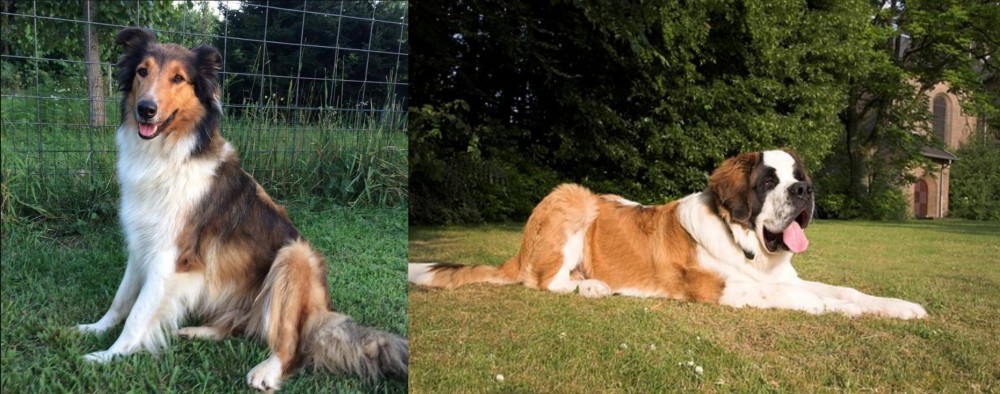 Scotch Collie is originated from United Kingdom but St. Bernard is originated from Switzerland. Scotch Collie may grow 10 cm / 3 inches shorter than St. Bernard. Scotch Collie may weigh 58 kg / 127 pounds lesser than St. Bernard. Scotch Collie may live 6 years more than St. Bernard. Both Scotch Collie and St. Bernard has almost same litter size. Scotch Collie requires Moderate Maintenance. But St. Bernard requires High Maintenance
Scotch Collie is originated from United Kingdom but St. Bernard is originated from Switzerland. Scotch Collie may grow 10 cm / 3 inches shorter than St. Bernard. Scotch Collie may weigh 58 kg / 127 pounds lesser than St. Bernard. Scotch Collie may live 6 years more than St. Bernard. Both Scotch Collie and St. Bernard has almost same litter size. Scotch Collie requires Moderate Maintenance. But St. Bernard requires High Maintenance
 The landrace breed, which started in the highlands of Scotland is known as the Scotch Collie. There were at the time two types of collies – the Rough or long haired collie and the smooth or short haired collie. The Scotch Collie is considered to be from a line of very ancient herding dogs. It might have existed in the days of the Roman Empire, these herding dogs might have included the Native Celtic Dogs, Roman Cattle Dogs, Gordon Setter, Viking Herding Spitzes and Irish Setters.
The landrace breed, which started in the highlands of Scotland is known as the Scotch Collie. There were at the time two types of collies – the Rough or long haired collie and the smooth or short haired collie. The Scotch Collie is considered to be from a line of very ancient herding dogs. It might have existed in the days of the Roman Empire, these herding dogs might have included the Native Celtic Dogs, Roman Cattle Dogs, Gordon Setter, Viking Herding Spitzes and Irish Setters.
In its native land the Scotch Collie is often called the colley dogs, coaly and cooley. Collie comes from the Scottish words for black coal – or the Coaley Sheep they herded. In addition to herding, the Scotch Collie also acted as a hunter and guard dog for its family. A large group of these collies were exported to America to work on family farms. Soon they were so popular they became family pets. They were first shown in both England and America in in the mid to late 1800’s.
The Scotch Collie Club was formed in 1885 and the breed accepted into the AKC the same year. The Collie Club of America started the following year. The AKC eventually dropped the moniker Scotch in favor or Rough and Smooth Collie. This move also separated the show dogs from the still working/herding Scotch Collies.
Aa time went on and the collie became more prominent in conformation competitions, some breeders mixed in the Greyhound and perhaps the Borzoi to get the collie we see today. The Scotch Collie itself eventually lost its independent recognition in the UKC and the NKC. It was mixed in with the English Shepard, but it was an important element in the development of the Australian Shepard, Shetland Sheepdogs and Border Collies.
The breed had a revival of sorts in the early 2000’s as the Old Time Scotch Collie. Any type of farm collie in America and Canada can be registered in the OTSCA. They are more often referred to as Old Time Farm Shepherds to avoid confusion them with the very popular collies. In 2017 there were 174 of these OTSCA dogs. Collies today have less working instincts, and the heeling instinct seems to be gone.
Today the show version of the Scotch Collie is recognized by both the AKC and UKC in the herding group.
It has been said of the Scotch Collie that they have “the majesty of a lion, the pride of a great thoroughbred stallion, the confidence of a Winston Churchill.”
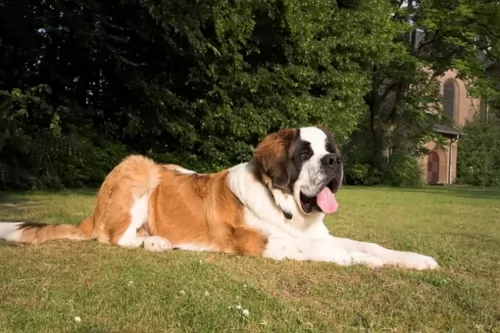 The St Bernard breed was once called the Alpine Cattle Dogs or the Alpine Mountain Dogs. They have always been farm dogs and mountain dogs in the French and Swiss Alps. They come from the border land of Switzerland and France. They were herding dogs, hunting, search and rescue, watchdogs and draft dogs.
The St Bernard breed was once called the Alpine Cattle Dogs or the Alpine Mountain Dogs. They have always been farm dogs and mountain dogs in the French and Swiss Alps. They come from the border land of Switzerland and France. They were herding dogs, hunting, search and rescue, watchdogs and draft dogs.
Their ancestors are considered to include the Sennenhunds and molosser breeds that came to the Alps with the ancient Romans. There are four Sennenhund breeds that are believed to have contributed to the original St. Bernard. These included the Greater Swiss Mountain Dog (Grosser Schweizer Sennenhund), the Appenzeller (Appenzeller Sennenhund), the Bernese Mountain Dog (Berner Sennenhund) and the Entlebucher Mountain Dog (Entlebucher Sennenhund) Today the St. Bernard is considered a Molossoid breed.
The first we know of the St. Bernard in any written records was in 1707 at the Great St. Bernard Pass and Great St. Bernard Hospice run by monks. There were found paintings of the dogs dating back into the late 1600’s. It is told that Barry saved upward of 100 people in the St. Bernard pass, and it is from these stories that the dogs gained their snow rescue reputation.
The St. Bernard of that time did not look like the St. Bernard does today as there was much crossbreeding. Many dogs dies during rescues in the avalanches of the mid 1800’s and so they Saint was crossed with the Newfoundland to preserve the breed. You can today see the resemblance in the build and looks of the two breeds. This cross brought about the long haired St. Bernard whose fur was too heavy for rescues.
The St. Bernards of mountain rescue fame were only about the size of a German Shepherd dog and were short haired. After crossing with the Newfoundland and moving into clubs and dogs shows, they have been bred to be much larger. Before the stud book was closed, it is thought that many larger breeds such as the Greater Swiss Mountain Dog, the English Mastiff, the Tibetan Mastiff, the Rottweiler, the Great Pyrenees, the English Bulldog, the Great Dane, the Bernese Mountain Dog, the Boxer and the Caucasian Oycharka all contributed to today’s St. Bernard.
In 1884 The Swiss St. Bernard Club was founded and the breed entered the Swiss Stud book as its first entry in 1884. It was 1888 when the standard was approved and the breed became the national dog of Switzerland. Before the name St. Bernard came to be common, these dogs might be called, Barry Dogs, Alepnmastiff, Noble Steeds or Saint Dogs.
The dogs came to England in the early 1800s and to the United States soon after. They were recognized by the European kennel clubs first and by the early 1900’s they were the most popular breed in the AKC.
 This Scotch Collie is an athletic, intelligent, well-balanced and alert dog. This collie has no exaggerated features like the long nose/muzzle of the current collies. This Scotch Collie is sound in mind and body, a hard working dog. He is hearty and versatile. They are longer than they are tall. Their heads are moderate and the stoop is well defined. They have a wide, flat skull. Their lips are tight and they are fitted well.
This Scotch Collie is an athletic, intelligent, well-balanced and alert dog. This collie has no exaggerated features like the long nose/muzzle of the current collies. This Scotch Collie is sound in mind and body, a hard working dog. He is hearty and versatile. They are longer than they are tall. Their heads are moderate and the stoop is well defined. They have a wide, flat skull. Their lips are tight and they are fitted well.
Their ears are also moderate in size and pointed or partially erect. They should not have long or droopy ears. They have eyes that might be oblique, almond, and round. The eyes are usually brown and merles may have blue eyes. The breed has a deep chest, broad shoulders and a long tail. There are also some bobtails that occur naturally.
 Today’s St. Bernard is not a large dog, he is a giant dog. Weighing in at 140-200 pounds and standing 28 to 35 inches tall, he is a lot of dog. Bred with mastiffs and large mountain dogs, they have proportional and powerful build. They are strong, sturdy and well muscled. They have either a smooth or rough (short or long) coat. Their eyes are brown or occasionally blue. They have tight lids, and square heads and muzzles.
Today’s St. Bernard is not a large dog, he is a giant dog. Weighing in at 140-200 pounds and standing 28 to 35 inches tall, he is a lot of dog. Bred with mastiffs and large mountain dogs, they have proportional and powerful build. They are strong, sturdy and well muscled. They have either a smooth or rough (short or long) coat. Their eyes are brown or occasionally blue. They have tight lids, and square heads and muzzles.
There are two coat types called smooth and rough, or short and long. The smooth shorter coat is tough, flat and close against the body and the long, rough coat is dense, wavy and heavy around the legs, neck and ruff. Both types have long tails that hang low and are heavy. Saints are known to slobber, drool and snore.
 3.Adaptability - Scotch Collies are versatile and adaptable. There is no need to crate them as they are not destructive. If you have a large run or kennel, they can live anywhere. However they are happiest on farms and open lands.
3.Adaptability - Scotch Collies are versatile and adaptable. There is no need to crate them as they are not destructive. If you have a large run or kennel, they can live anywhere. However they are happiest on farms and open lands.
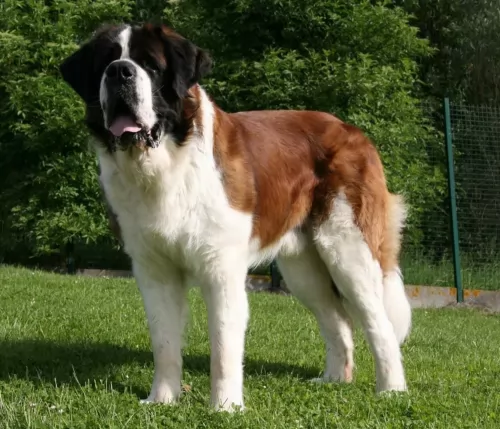 3.Adaptability no - these are giant dogs that need a lot of room. A large fenced yard or farm is best. They won’t do well in an apartment. They need exercise every day and loping around a yard is very good for them. They love to play in the snow, carry a backpack or pull a cart. They love to have a “job”
3.Adaptability no - these are giant dogs that need a lot of room. A large fenced yard or farm is best. They won’t do well in an apartment. They need exercise every day and loping around a yard is very good for them. They love to play in the snow, carry a backpack or pull a cart. They love to have a “job”
4.Learning ability – They are smart and highly trainable if motivated. They may appear lazy but they are just laid back and need a motivation.
 The old line breed was hearty with few health issues. The ones they did have included:
The old line breed was hearty with few health issues. The ones they did have included:
• Skin problems - can have skin diseases like mange that may or may not be acute, may have allergies or sensitivities.
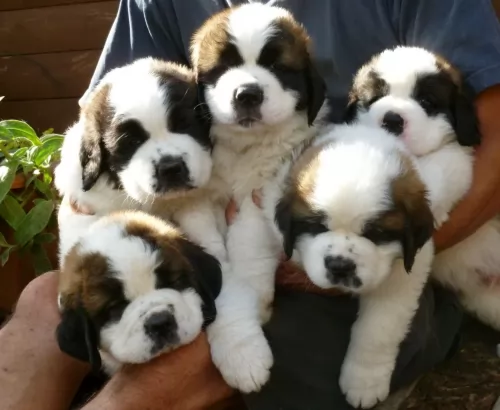 The first problem this breed faces is how fast they grow and gain weight. This can lead to serious health issues if not controlled. Their bones can be damaged by this excessively fast rate of growth. Other issues facing the breed include:
The first problem this breed faces is how fast they grow and gain weight. This can lead to serious health issues if not controlled. Their bones can be damaged by this excessively fast rate of growth. Other issues facing the breed include:
 1Feeding the puppy - The Scotch Collie is not a medium dog nor is it a large dog. It is somewhere in-between. Because of this there is some discretion in not only how much you feed your puppy, but also what you feed. Normally we would feed according to breed size but here you need a high quality formula that is made for working breeds. The puppy will need enough calories to meet their high energy needs. Feed at least 3-4 times a day.
1Feeding the puppy - The Scotch Collie is not a medium dog nor is it a large dog. It is somewhere in-between. Because of this there is some discretion in not only how much you feed your puppy, but also what you feed. Normally we would feed according to breed size but here you need a high quality formula that is made for working breeds. The puppy will need enough calories to meet their high energy needs. Feed at least 3-4 times a day.
2.Feeding the adult - you need a high quality formula that is made for working breeds. The adult will need enough calories to meet their high energy needs. Feed at least 2 times a day.
There is a high need for exercise starting with walks or jog but that is not going to be enough. The Scotch Collie is not a Border Collie or a Corgi in terms of energy, but they are not couch potaoes. They need more than access to a yard. They need a job or they need defined exercise and play. The daily walk or jog will do it but intense play is better.
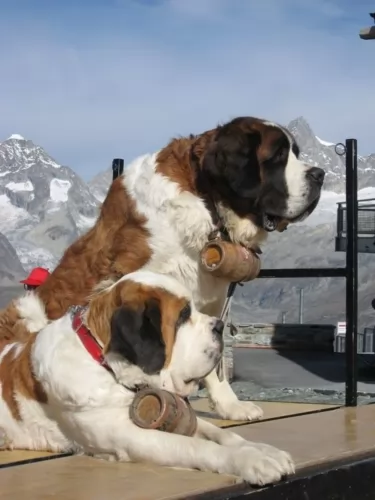 1.Feeding the puppy – You want to control their growth. Do not overfeed, and make sure they exercise but not too much. Feed a high quality large breed puppy food 3-4 X a day in small amounts.
1.Feeding the puppy – You want to control their growth. Do not overfeed, and make sure they exercise but not too much. Feed a high quality large breed puppy food 3-4 X a day in small amounts.
2.Feeding the adult – The problem you face with he adult St. Bernard is the potential for Bloat. Don’t over feed. Don’t feed before or after strenuous exercise. Feed 2-3 X a day in smaller amounts to prevent Bloat. Feed a high quality breed specific food if possible or an extra large breed formula.
4. Games and Exercises They need exercise but not as much as you might think. The St. Bernard is a laid back lumbering character so don’t over exercise her. They enjoy weight and cart pulling but they are not athletes who enjoy frisbee or agility. Search and rescue trials and tracking trials are perfect athletic endeavors for them.